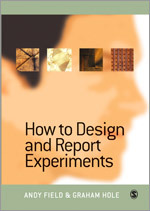How to Design and Report Experiments
- Andy Field - University of Sussex, UK
- Graham Hole - University of Sussex, UK
Research Methods in Psychology
While many books look at the fundamentals of doing successful experiments and include good coverage of statistical techniques, this book very importantly considers the process in chronological order with specific attention given to effective design in the context of likely methods needed and expected results. Without full assessment of these aspects, the experience and results may not end up being as positive as one might have hoped. Ample coverage is then also provided of statistical data analysis, a hazardous journey in itself, and the reporting of findings, with numerous examples and helpful tips of common downfalls throughout.
Combining light humour, empathy with solid practical guidance to ensure a positive experience overall, How to Design and Report Experiments will be essential reading for students in psychology and those in cognate disciplines with an experimental focus or content in research methods courses.
This book is absolutely brilliant to assist students through all steps of the process of planning, implementing and evaluating experiments. Many examples demonstrate how to do it the right way, so the text is easy to understand. Students will find this book useful from the very beginning through the whole university studies.
Andy Field provides a really accessible read which is essential for students needed to get to grips with experimental design. This and the SPSS book are perfect introductory texts to this area for undergrads, postgrads and staff.
This is simply a very good book. It fits exactly the course I am planning to teach, and it would by very useful for research students to own.
extremely useful book, well written and detailed.
The book seems to be a good suplement for my course, but I didn't adopt it yet. Probably next year I will suggest it as complementary to the course and especially good for those that want to broaden their knowledge in experimental psychology.
This is a useful text that is written in an accessible way. Sections of the reports are broken down nicely for students to make quick reference to parts that apply to them. The book is brimming with good advice and will serve as an excellent source on designing and reporting experiments.
This book explains the basics of experimental methodology. It seems to be written for undergraduate psychology students and for that group I would say both the writing style and the level is appropriate, clear and concise. It describes in clear terms the different steps of theorising and designing experimental research which is a useful practical guide for students. Most of my teaching is at the MSc and PhD level. I'll recommend it for those who find the other texts on the course to complex and need a starter on experimental methods, I do not consider it advanced enough or written in a style appropriate for that level.
Essential reading as it describes how to write up the results from experiments in a report format.
A very good coherent text. I will add it to suggested reading. It is particularly useful in providing clear guidance for report writing. A further benefit is that it will span both first and second year research methods courses.
This is an excellent and well written book by the same author as Discovering Statistics Using SPSS by Andy Field.
I was so impressed by Dr. Field's book that I wanted to see if his earlier work was of the same quality. It is! I have recommended this book to my RES 714 Quantitative Methods & Statistical Analysis class, as well as all my dissertation students.
One additional recommendation is to see the book updated to a newer edition. Original copyright is 2003.







